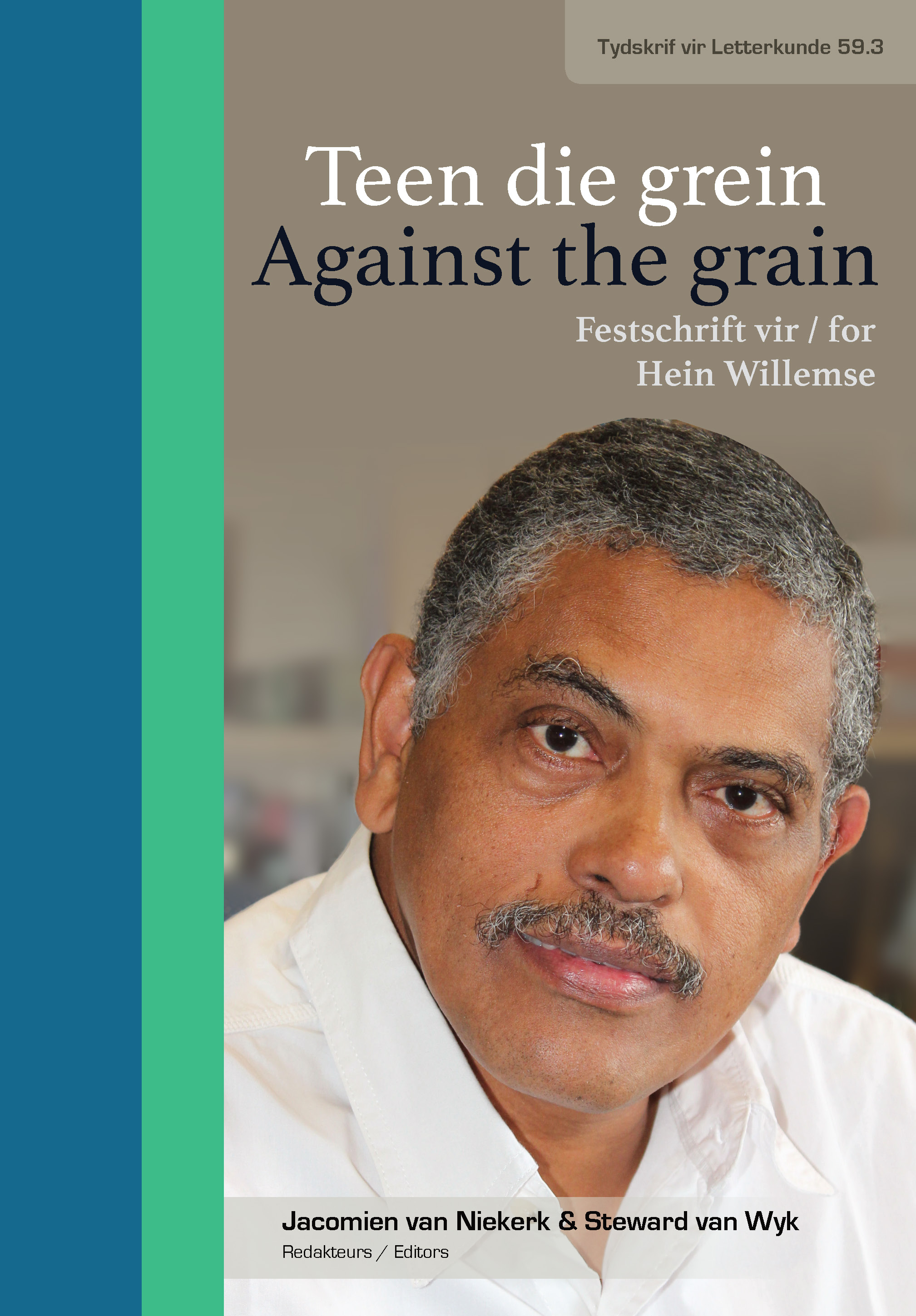The world is a bar: Fiston Mwanza Mujila’s writing beyond ‘Africa’
DOI:
https://doi.org/10.17159/tl.v59i3.13717Keywords:
Fiston Mujila, bar, sexism, controversyAbstract
Taking recent debates on ‘How to write Africa’ in general and the allegations of sexism in Fiston Mwanza Mujila’s novel Tram 83 in particular as a starting point, I analyze three texts by the Austria-based Congolese author in this article. Considering the scope of each text, namely Tram 83 (2014), the play Zu der Zeit der Königinmutter (The Times of the Queen Mother, 2018), and the latest novel La danse du vilain (The Dance of the Villain, 2020), shifting images and meanings of gender dichotomies are explored alongside Mujila’s aesthetic literary devices. The article is structured around the omnipresent setting of bars that develop from a disputable ‘African’ bar in Tram 83 to a radically global bar in Zu der Zeit der Königinmutter and to referentially set bars of Central Africa’s postcolonial history in La danse du vilain. I argue that recurrence of the bar as a focal lieu of mingling people in Mujila’s writing underlines its function as satirical microcosm that goes beyond a realistic representation of the Democratic Republic of the Congo. Multilayered cultural references in Tram 83 and Zu der Zeit der Königinmutter construct the setting into a worldly space whereas La danse du vilain privileges a historical approach. As further pointed out, the metatextual level that is woven into the texts comments on the difficulty of the adequate representation of ‘Africa’ and the pitfalls of the global literary market place.
Downloads
References
Brezault, Éloïse. “Le ‘théâtre-conte’ chez Fiston Nasser Mwanza Mujila: une histoire du présent. Entretien avec l’auteur.” Francofonia no. 76, 2019, pp. 137–44.
De Boeck, Filip & Marie-Françoise Plissart. Kinshasa: Tales of the Invisible City. Ludion, 2005.
Deckard, Sharae. “Trains, Stones, and Energetics: African Resource Culture and the Neoliberal World Ecology.” World Literature, Neoliberalism, and the Culture of Discontent, edited by Sharae Deckard & Stephen Shapiro. Palgrave Macmillan, 2019, pp. 239–62.
Fyfe, Alexander. “Infrastructure and the Valences of the Literary in Fiston Mwanza Mujila’s Tram 83.” Critique: Studies in Contemporary Fiction. DOI: https://doi.org/10.1080/00111619.2021.1875975.
Geuen, Vanessa. Kneipen, Bars und Clubs. Postmoderne Heimat- und Identitätskonstruktionen in der Literatur. Ripperger & Kremers, 2016.
Habila, Helon. “We Need New Names by NoViolet Bulawayo—review.” The Guardian. 20 Jun. 2013. https://www.theguardian.com/books/2013/jun/20/need-new-names-bulawayo-review.
Higginson, Pim. “Drinking scenes: Alcohol in the Francophone African novel.” Routledge Handbook of African Literature. edited by Carli Coetzee & Moradewun Adejunmobi. Routledge, 2019, pp. 305–19.
Ikheloa, Ikhede. “Mujila Fiston Mwanza’s Tram 83: Requiem for the African writer, and again, the balance of today’s stories.” Pa Ikhide. 16 Apr. 2017. https://xokigbo.com/2017/04/16/mujila-fiston-mwanzas-tram-83-requiem-for-the-african-writer-and-again-the-balance-of-todays-stories/.
Innerhofer, Judith E. “‘Zu der Zeit der Königinmutter’: Die Bar als Bühne des Daseins.” Die Zeit. 25 Feb. 2019. https://www.zeit.de/2019/09/zeit-koeniginmutter-theaterstueck-fiston-mwanza-mujila-akademietheaterutm_referrer=https%253A%252F%252F.
Jelly-Schapiro, Eli. “Extractive Modernity at Large: The Contemporary Novel of Primitive Accumulation.” Interventions. DOI: https://doi.org/10.1080/1369801X.2021.2003221.
Jewsiewicki, Bogumil. Mami Wata. La peinture urbaine au Congo. Gallimard, 2003.
Kapanga, Kasongo Mulenda. “UDPS Opposition Populism in the DRC and Its Reflection in Two Congolese Novels.” English Studies in Africa vol. 63, no. 1, pp. 167–78. DOI: https://doi.org/10.1080/00138398.2020.1780763.
Laferrière, Dany. Je suis un écrivain japonais. Grasset, 2008.
Mabanckou, Alain. “Foreword.” Tram 83, translated by Roland Glasser. Jacaranda, 2015, pp. I–II.
Mbembe, Achille. De la postcolonie. Essai sur l’imagination politique dans l’Afrique contemporaine. La Découverte, 2020.
McMorran, Will. The Inn and the Traveller: Digressive Topographies in the Early Modern European Novel. Legenda, 2002.
Mujila, Fiston Mwanza. La danse du vilain. Métailié, 2020.
Mujila, Fiston Mwanza. Tram 83. Métalié, 2014.
Mujila, Fiston Mwanza. Tram 83, translated by Roland Glasser. Jacaranda, 2015.
Mujila, Fiston Mwanza. “Zu der Zeit der Königinmutter.” Theater Theater. Aktuelle Stücke, edited by Uwe B. Carstensen, et al. Fischer, 2018, pp. 173–219.
Newman, Ian. The Romantic Tavern: Literature and Conviviality in the Age of Revolution. Cambridge U P, 2019.
Obi-Young, Otosirieze. “Is Fiston Mujila’s ‘Tram 83’ Misogynist Poverty Porn? Zukiswa Wanner and Richard Oduku Lead Strong Reaction to Ikhide Ikheloa’s Damning Criticism.” Brittle Paper. 24 Apr. 2017. https://brittlepaper.com/2017/04/fiston-mujilas-tram-83-misogynist-poverty-porn-zukiswa-wanner-richard-oduko-lead-strong-reaction-pa-ikhides-damning-criticism/.
Oduku, Oduor. “Poverty Porn—A New Prison for African Writing.” Richard Oduor. 24 Apr. 2017. https://richardoduor.wordpress.com/2017/04/24/poverty-porn-a-new-prison-for-african-writers/.
Quayson, Ato. “The Improvisational Jazz Rhythms of Fiston Mwanza Mujila’s Tram 83.” Brittle Paper. 30 Mar. 2016. https://brittlepaper.com/2016/03/review-improvisational-jazz-rhythms-fiston-mwanza-mujilas-tram-83-ato-quayson/.
Stratton, Florence. Contemporary African Literature and the Politics of Gender. Routledge, 1994.
Tidmarsh, Katie. “Tram 83: Trains, traumatismes et transnationalisme dans les écrits de Fiston Mwanza Mujila.” Francofonia no. 76, 2019, pp. 51–66.
Wainaina, Binyavanga. How to write about Africa. Kwani Trust, 2008.
Published
Issue
Section
License
Copyright (c) 2022 Tydskrif vir Letterkunde

This work is licensed under a Creative Commons Attribution-ShareAlike 4.0 International License.


 https://orcid.org/0000-0001-6465-6584
https://orcid.org/0000-0001-6465-6584


.png)